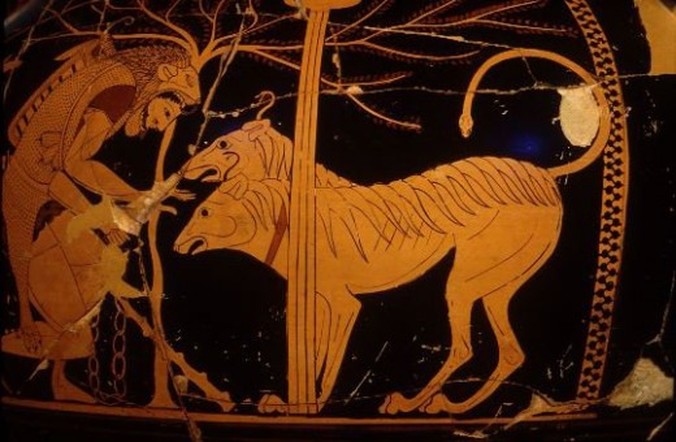ORTHUS IN GREEK MYTHOLOGY
Orthus was a monstrous hound that appeared in tales from greek mythology; of similar ilk to Cerberus, Orthus is less well known than Cerberus, but Orthus too was encountered by Heracles.
The Monstrous Family Line of Orthus
The name Orthus is given by Hesiod in the earliest surviving sources, but writers subsequently would name the monstrous hound Orthrus or Orthros as well.
It is most commonly said that Orthus was one of the monstrous offspring of Typhon and Echidna, the parents of many of the most famous Greek mythological monsters, and Orthus was thus sibling to the likes of the Chimera and the Lernaean Hydra.
The Orthus was additionally named parent of monsters, and by partnering with the Chimera, or perhaps Echidna, the Sphinx and the Nemean Lion were brought forth.
It is most commonly said that Orthus was one of the monstrous offspring of Typhon and Echidna, the parents of many of the most famous Greek mythological monsters, and Orthus was thus sibling to the likes of the Chimera and the Lernaean Hydra.
The Orthus was additionally named parent of monsters, and by partnering with the Chimera, or perhaps Echidna, the Sphinx and the Nemean Lion were brought forth.
Descriptions of Orthus
|
Orthus was a monstrous hound in Greek mythology, and his primarily notable characteristic was the fact that he had had two heads. Aside from two heads, and his enormous size, perhaps the only other distinguishing feature of Orthus was the fact that some writers describe Orthus as having a snake tail, rather than a normal dog tail.
There is perhaps little, aside from an additional head, in differentiating between Orthus and Cerberus. |
|
The Guard Dog Orthus
Orthus was particularly associated with the Island of Erythea, the Sunset Isles, in this setting, it is perhaps appropriate that the name Orthus can be translated as “twilight”. Whilst monsters were normally associated with an area because they ravaged it, as in the case of the Nemean Lion, Orthus was employed upon the Island of Erythea.
Orthus was considered to be a guard dog, with Eurytion, the son of Ares, as his master, with both Orthus and Eurytion charged with guarding the cattle of Geryon.
Orthus was considered to be a guard dog, with Eurytion, the son of Ares, as his master, with both Orthus and Eurytion charged with guarding the cattle of Geryon.
Orthus and Heracles
The red cattle of Ceryon were both famous and valuable, and thus it was that King Eurystheus would task Heracles with bringing those cattle back to Toryns as Heracles' Tenth Labour.
Arriving upon the Island of Erythea, Heracles camps for the night upon Mount Abas, planning to embark on the stealing of Geryon's cattle the following night.
Orthus though smells the scent of the stranger from miles away, and immediately sets off to confront the stranger; and Eurytion follows after his guard dog.
The approach of Orthus though is not a stealthy one, and Heracles is well aware of the approach of the monstrous hound; and as Orthus rushes at him, Heracles swings his club, and Orthus drops down dead, with a head caved in, before any injury can be inflicted upon the Greek hero. Eurytion soon follows his hound into the afterlife, for he too is killed by Heracles.
Arriving upon the Island of Erythea, Heracles camps for the night upon Mount Abas, planning to embark on the stealing of Geryon's cattle the following night.
Orthus though smells the scent of the stranger from miles away, and immediately sets off to confront the stranger; and Eurytion follows after his guard dog.
The approach of Orthus though is not a stealthy one, and Heracles is well aware of the approach of the monstrous hound; and as Orthus rushes at him, Heracles swings his club, and Orthus drops down dead, with a head caved in, before any injury can be inflicted upon the Greek hero. Eurytion soon follows his hound into the afterlife, for he too is killed by Heracles.
|
|
Colin Quartermain - Orthus - 22nd September 2018
